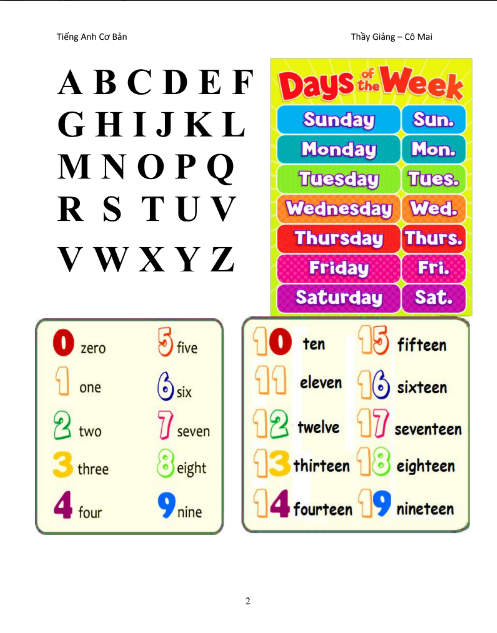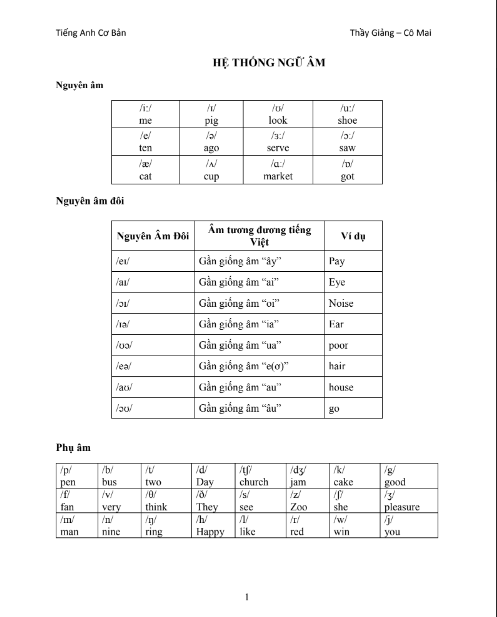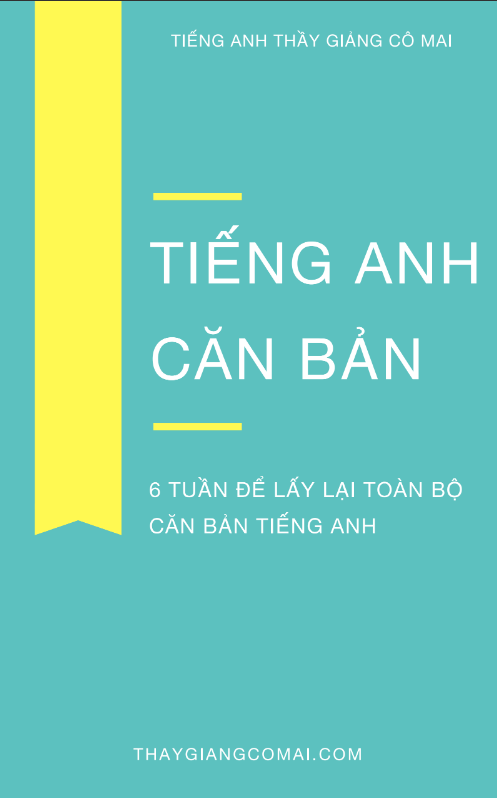


Mục lục
ToggleI. Theory (Lý thuyết)
1. Pronouns (Đại từ)
| Ngôi | Số ít | Số nhiều |
|---|---|---|
| Ngôi thứ I | I (tôi) | We (chúng tôi) |
| Ngôi thứ II | You (bạn) | You (các bạn) |
| Ngôi thứ III | He (anh ấy), She (cô ấy), It (nó), Mary | They (họ) |
2. The present simple tense (Thì hiện tại đơn)
a. Structure (Cấu trúc)
Được xét theo loại động từ. Trong tiếng Anh có 2 loại động từ:
- Động từ Tobe
- Động từ thường
Động từ tobe
Tobe trong thì hiện tại đơn có 3 thể: am, is, are (thì, là, ở)
Câu khẳng định:
I + am → I’m
He, She, It, Mary + is → he’s
You, We, They + are → you’re
Ví dụ:
- She is beautiful. (Cô ấy thì đẹp)
- I am a teacher. (Tôi là một giáo viên)
- They are teachers. (Họ là những giáo viên)
- They are at home. (Họ ở nhà)
Câu phủ định:
Thêm “not” sau động từ tobe.
I am not → I’m not
He, She, It, Mary + is not → isn’t
You, We, They + are not → aren’t
Ví dụ:
- She is not beautiful. (Cô ấy thì không đẹp)
- I am not a teacher. (Tôi không là một giáo viên)
- They are not at home. (Họ không ở nhà)
Câu nghi vấn:
Đưa động từ tobe lên trước chủ từ (dịch là “có… hay không”).
| Dạng | Cách trả lời |
|---|---|
| Am I…? | Yes, I am. / No, I’m not. |
| Is he/she/it/Mary…? | Yes, he/she/it is. / No, he/she/it isn’t. |
| Are you/we/they…? | Yes, we/you/they are. / No, we/you/they aren’t. |
Ví dụ:
- Is she beautiful? (Cô ấy có đẹp không?) → Yes, she is. / No, she isn’t.
- Are you a teacher? (Bạn có là giáo viên không?) → Yes, I am. / No, I’m not.
- Are they at home? (Họ có ở nhà không?) → Yes, they are. / No, they aren’t.
Động từ thường
Là những động từ còn lại như run (chạy), play (chơi), jump (nhảy), swim (bơi), …
Câu khẳng định:
I, You, We, They + V (nguyên mẫu)
He, She, It, Mary + V(s/es)Có thể bạn cũng muốn đọc thêm các cuốn sách tiếng Anh sau:
Lưu ý:
Nếu chủ ngữ là ngôi thứ 3 số ít → thêm s/es vào động từ chính.
- Thêm s với hầu hết động từ: go → goes, pass → passes, fix → fixes, wash → washes, …
Ví dụ:
- I swim. (Tôi bơi)
- He swims. (Anh ấy bơi)
- They go to school. (Họ đi học)
- She goes to school. (Cô ấy đi học)
Câu phủ định:
Thêm “not” sau do/does.
I, You, We, They + do not (don’t) + V nguyên mẫu
He, She, It, Mary + does not (doesn’t) + V nguyên mẫu
Ví dụ:
- I don’t swim. (Tôi không bơi)
- He doesn’t swim. (Anh ấy không bơi)
- They don’t go to school. (Họ không đi học)
- She doesn’t go to school. (Cô ấy không đi học)
Câu nghi vấn:
Đưa do/does ra trước chủ từ.
| Cấu trúc | Cách trả lời |
|---|---|
| Do + I, you, we, they + V? | Yes, I/you/we/they do. / No, I/you/we/they don’t. |
| Does + he, she, it, Mary + V? | Yes, he/she/it does. / No, he/she/it doesn’t. |
Ví dụ:
- Do you swim? (Bạn có bơi không?) → Yes, I do. / No, I don’t.
- Does he swim? (Anh ấy có bơi không?) → Yes, he does. / No, he doesn’t.
- Do they go to school? (Họ có đi học không?) → Yes, they do. / No, they don’t.
b. Usage (Cách dùng):
- Một thói quen, một hành động xảy ra thường xuyên ở hiện tại.
- Các trạng từ chỉ tần suất đi với thì này:
always, usually, often, sometimes, never, every day/week/month/year.
III. Bài đọc (Reading Practice)
Bài 1: Jane
Jane is a student. In the summer, she doesn’t go to school. She is at home.
In the morning, she does the housework. Then, she reads a book and listens to music.
In the afternoon, she usually plays soccer with other students. They shout and laugh.
They are happy. They eat and drink. Then she goes home.
In the evening, she watches TV. She doesn’t do homework. At ten, she sleeps.
She loves summer!
Câu hỏi:
a) Is Jane a doctor?
b) Does she go to school in the summer?
c) Does she do homework in the morning?
d) Are they happy in the afternoon?
e) Does she love summer?
Bài 2: James
James is a doctor. He works in the hospital. He starts a day in the morning and finishes in the evening.
In the hospital, he meets some nurses. They are tall and thin but they are not weak.
They are strong. They are young and beautiful. James is short and fat but he is handsome.
The director is old. He is always happy. He usually stands at the door and looks at James.
In the afternoon, they are hungry. They go to a restaurant. They meet a guard and he opens the door.
In the restaurant, they eat and drink. James is not sad. He is happy.
Câu hỏi:
a) Is James a doctor?
b) Does he work at the bank?
c) Are the nurses tall?
d) Are they old?
e) Is James thin?
f) Is the director sad?
g) Does he usually look at James?
IV. Vocabulary (Từ vựng)
Noun: danh từ
| Season /ˈsiːzn/ Mùa | Job /dʒɒb/ Nghề nghiệp |
|---|---|
| spring /sprɪŋ/ mùa xuân | teacher /ˈtiːtʃə(r)/ giáo viên |
| summer /ˈsʌmə(r)/ mùa hè | student /ˈstjuːdnt/ sinh viên |
| fall /fɔːl/ mùa thu | engineer /ˌendʒɪˈnɪə(r)/ kỹ sư |
| winter /ˈwɪntə(r)/ mùa đông | doctor /ˈdɒktə(r)/ bác sĩ |
| nurse /nɜːs/ y tá | dentist /ˈdentɪst/ nha sĩ |
| singer /ˈsɪŋə(r)/ ca sĩ | manager /ˈmænɪdʒə(r)/ quản lý |
| director (giám đốc) /daɪˈrektə(r)/ | businessman /ˈbɪznəsmən/ nam doanh nhân |
| businesswoman /ˈbɪznəswʊmən/ nữ doanh nhân | salesperson /ˈseɪlzˌpɜːsn/ nhân viên bán hàng |
| secretary /ˈsekrətri/ thư ký | worker /ˈwɜːkə(r)/ công nhân |
| driver /ˈdraɪvə(r)/ tài xế | guard /ɡɑːd/ bảo vệ |
| receptionist (lễ tân) /rɪˈsepʃənɪst/ | lawyer /ˈlɔːjə(r)/ luật sư |
| police officer /pəˈliːs ˈɒfɪsə(r)/ cảnh sát | farmer /ˈfɑːmə(r)/ nông dân |
Adjective: Tính từ
| hot /hɒt/ nóng | cold /kəʊld/ lạnh | warm /wɔːm/ ấm | cool /kuːl/ mát |
|---|---|---|---|
| thirsty /ˈθɜːsti/ khát | hungry /ˈhʌŋɡri/ đói | full /fʊl/ no | tired /ˈtaɪəd/ mệt |
| tall /tɔːl/ cao | short /ʃɔːt/ thấp | beautiful /ˈbjuːtɪfl/ đẹp gái | ugly /ˈʌɡli/ xấu |
| young /jʌŋ/ trẻ | old /əʊld/ già | happy /ˈhæpi/ hạnh phúc | sad /sæd/ buồn |
| strong /strɒŋ/ khỏe | weak /wiːk/ yếu | poor /pʊə(r)/ nghèo | rich /rɪtʃ/ giàu |
| big /bɪɡ/ lớn | small /smɔːl/ nhỏ | thin /θɪn/ gầy | fat /fæt/ mập |
| black /blæk/ đen | white /waɪt/ trắng | gray /ɡreɪ/ xám | red /red/ đỏ |
| orange /ˈɒrɪndʒ/ cam | yellow /ˈjeləʊ/ vàng | green /ɡriːn/ xanh lá | blue /bluː/ xanh biển |
| brown /braʊn/ nâu | purple /ˈpɜːpl/ tím | pink /pɪŋk/ hồng | handsome /ˈhænsəm/ đẹp trai |
Prepositions: giới từ
| in (ở trong) | on (ở trên) | at (tại) |
|---|---|---|
| in the house /haʊs/ nhà | on the table /ˈteɪbl/ bàn | at home /həʊm/ nhà |
| in the car /kɑː(r)/ xe hơi | on the chair /tʃeə(r)/ ghế | at the bank /bæŋk/ ngân hàng |
| in the box /bɒks/ hộp | on the sofa /ˈsəʊfə/ ghế sofa | at the party /ˈpɑːti/ buổi tiệc |
| in the refrigerator: tủ lạnh /rɪˈfrɪdʒəreɪtə(r)/ | on the shelf /ʃelf/ kệ | at the airport /ˈeəpɔːt/ sân bay |
| in the room /ruːm/ phòng | on the tree /triː/ cây | at the concert /ˈkɒnsət/ hòa nhạc |
| in the hospital /ˈhɒspɪtl/ bệnh viện | on the floor /flɔː(r)/ sàn nhà | at school /skuːl/ trường học |
| in the factory /ˈfæktri/ nhà máy | on the bus /bʌs/ xe buýt | at the door /dɔː(r)/ cửa ra vào |
Các sách tiếng anh khác cùng chủ đề:



